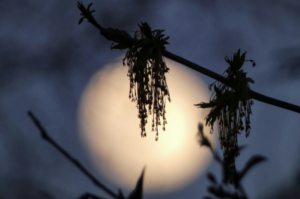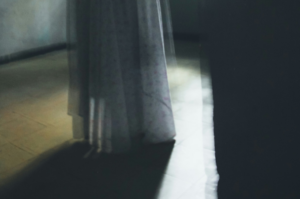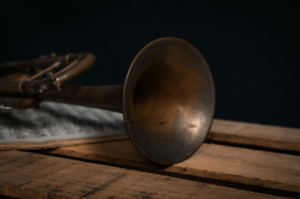
His mother never calls at 3 am, so when she tells him that his father has passed on, he believes her.
Mnqobi is among the people on the queue to enter the blue and white taxi, parked near the worn out signpost written ‘PHOLA’, which blocks the rays of the morning sun. The lump on his chest is replaced by the duffel bag slung over his shoulder, its weight threatening to wrench his arm from its socket. When his turn to enter arrives, he chooses a seat at the back, whispering silent apologies as his legs navigate around the bags strewn across the floor.
The echo of his mother’s voice bounced off his temples, refusing to be still. “UBab’ wakho usishiyile.” He tried shaking off the disbelief he felt even though the finality of the statement proved it. All the chances he had to reach out to his father lingered at the back of his mind, haunting him like an unwanted shadow.
He thought about how he should’ve gone home more often, or tried initiating calls to his father directly instead of inquiring about him from his mother, who never divulged too little or too much detail about him. “You know how your father is,” she often said, leaving him to deduce from past calls that nothing had really changed since he left. That his father still came home late, threw tantrums when he couldn’t find money for a bottle of liquor, and that he still woke up in the terrors of the night with sweat all over his body no longer screaming but instead drifting back to sleep, with tears streaming down his face.
From his seat, he looks outside the window, his eyes closely following the pigeon that ate slops of food from the discarded takeaway dishes that stood like wilted flowers along the pavement. Like the bird, he had lived his life with caution, surveying his surroundings, waiting for movement, a threat – or danger in case there was need for flight. So, when the first chance at flight came, a relocation package with good remuneration as a news reporter, he seized it without reluctance, his mother’s happiness abandoning her to dance, then cry in celebration. But he looked around for his father, before spreading his wings like the pigeon that now flew from the pavement and out of sight.
That night, after sharing the good news with his mother, he woke up to banging in the living room so he went to see where it came from. He walked into the room lit by white snow from the TV as his father banged it on the side to have it show the highlights from the soccer match earlier. He had sensed his high spirits from the gwijo he sang, hailing his favourite team so when his father saw him standing by the wall, he asked why he was still up.
“Finally, I’ve found a job,” he managed to say through his dry throat. His eyes followed the lines on the screen, unsure what to expect.
“Mh, I guess the miracles your mom talks about, do happen heh?” Mnqobi watched him move from the television to pick up his bottle of beer. “I told you that you would’ve been long employed if you chose to do politics like –”
“Like Nqobile would have done? Is that what you wanted to say?” he said, not allowing his father to finish.
The static from the TV screeched. He didn’t notice when his mother came into the room, fastening the belt of her gown before she went to his father who was staggering, but insisted on standing. “Mnqobi, you shouldn’t talk to your father like that” she said, helping him sit on the couch. He didn’t understand why she ran to his defence all the time. He remembers how shocked she was when her sisters barged through the doors of the police station, after he had called the police the night before, trying so hard to focus on the voice of the policeman instead of his mother’s screams in the background. She warned him the next day, while he placed a warm towel over the bruise on her cheek, careful not to let it open up more skin, “Don’t call your aunts or the police again when your father and I fight, okay? Fights happen all the time between parents. Ufun’ ukung’hlambalaza?” Do you want to embarrass me?
His mouth whispered a “No” as he watched his mother’s chest slowly rise and fall, breathing unevenly. “I won’t do it again,” but his reply fell on deaf ears as she looked down, and cried bitterly.
“I don’t care that you’ve found a job or not, but you’re not going to talk to me like that, young boy,” he slurred, his voice bringing him back into the living room.
“Baba, is it fair? All this time I’ve been trying to do right by you. I don’t even know what right is anymore because you never approve of anything I do. It’s like I am suffering for something I don’t know. You’re acting like I’m the one that killed her.”
For years, that’s all his mind could replay when his father crossed his mind, that particular night when he left him to comfort his mother as he stormed out the house, slamming the door in anger. When it was time for him to leave Phola, his mother took it upon herself to hold his suitcase while walking him all the way to the rank, and when the taxi’s engine surged, her eyes gleamed tears only this time he was unsure whether they still resembled joy or sadness.
Arriving in Johannesburg gave him a freedom that he couldn’t grasp but being able to provide for his family gave him comfort. Some days were good, but on some days, he missed being a little boy, listening to his mother hum and sway her body slowly to Wind Song on Makeba Sings, the first album he fell in love with. And right then, it would be like she had forgotten something when he would see her disappear into their bedroom, and he would follow her in time just to see her go under the bed, to drag the mahogany brown wooden kist where things of sentiment didn’t emerge unless remembered – and only then, revisited. It was the photo album that she reached for first, in the pool of relics that reminded her of moments long forgotten. The one with a bit of melted plastic and charred at the bottom left corner. At 12 years, he had memorised the sequence of the pictures – firstly, his mother’s first day at work, posing playfully in a chef’s hat, and then his father’s smile on stage while receiving an award, followed by the sepia picture which held both their gaze and smiles in place, with Nqobile on his mother’s lap, fiddling with a hockey stick as they tried to get her to pose for the camera. The same smiles he would yearn to see long after the album was closed.
In the picture, Nqobile looked at him with accusing eyes, blaming him for having the same full eyebrows they both inherited from his father and the exact plump cheeks that reminded him of all the time he had stolen more from her. Like that time he chose to enrol for hockey practice instead of visiting the library in the afternoons? Or that time he hid his disappointment behind the smile he had while admiring the blue car that his father bought him instead of the yellow one he asked for? And that time he enrolled for Political Studies in his first year before dropping the course in the second semester? But he had realised early on that he will never get the chance to tell her that with that compromise came all he ever wanted, even if it was for a minute – to make his father happy.
But he also realised that loss was relative, just like everyone in Phola who had lost something they loved – a husband to a bottle, money to a gamble, a child to the river that flowed under the bridge separating the township from the suburbs in Sunhill Heights. So, when his parents lost Nqobile, the loss was expected.
No one tells him that memory holds sound. Even after 23 years, his mother still heard the sounds of screaming and panic in the voices of people running around with buckets of sand, not caring to check where they found it, all they were concerned with was the burning shack they raced towards – shack 54, the first home they ever owned with his father. She remembers tugging at her cardigan, struggling to take it off when she realised she couldn’t because of the hands around her waist, preventing her from going through the smoke, into the blazing shack, where Nqobile waited for her. She didn’t realise that she hadn’t said a word since she arrived at the scene, even when her husband kept apologising profusely on his knees, allowing her body to be swayed in whatever direction while people tried to get her attention. All she focused on were the burnt remains of what were her home and her only joy. It was later, when the autopsy revealed that Nqobile had died of asphyxiation before the flames consumed her, that she let out a scream so loud and lost consciousness. Upon waking up to the blinding lights of the ward she was in, was when the doctor told her that she was pregnant.
He feels his mother’s hand on his shoulder as he momentarily suffers light-headedness from how close he’s standing to the open ground that receives his father’s coffin. His hand reaches for the pile of sand his uncle holds out to him on a shovel, his mind drifting to thoughts of seeing his father again – to tell him about Luvuyo, whom he met while in therapy, to tell him that he now understands why his smile never stretched to his cheeks, that he understands that before acceptance, there is a battle and that’s the battle that he kept on fighting so his smile could stretch longer and could genuinely be happy for him. But he lets the thought settle quietly in his mind, as he lets go of the pressure on his palm.










Ruth Njeri November 25, 2024 03:13
This is a beautiful piece of script. I loved it!